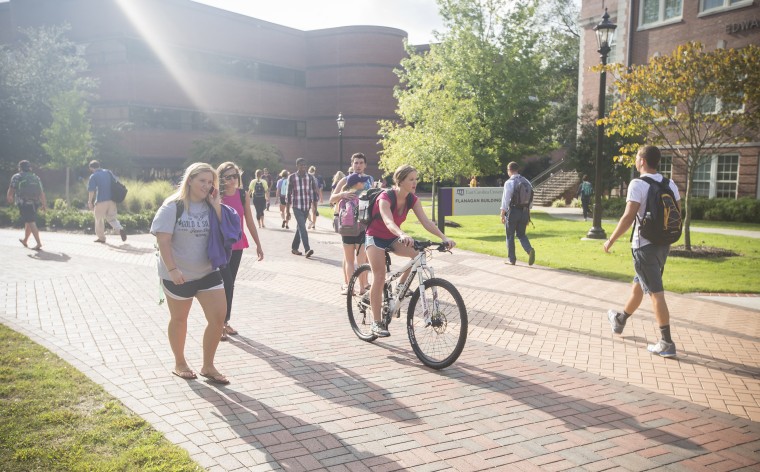A skyrocketing number of students are seeking crisis counseling at East Carolina University, prompting the school to make sure it educates pupils not just on academics but also on how to cope with life's challenges.
ECU reported a 16 percent increase in student counseling appointments in the past two years. Those involving a crisis were up 52 percent, according to a July report that shocked officials on the Greenville, North Carolina, campus.
“It wasn’t just the numbers, it was the intensity and severity,” said ECU Director of Counseling Valerie Kisler-van Reede. “It felt like something very different was going on — a lack of resiliency and the ability to cope.”
Special section: Get tips and advice about college at College Game Plan
As a result, the college has boosted its counseling staff and resources and also introduced a new program — Recognition, Insight and Openness or RIO — to teach students self-talk, journaling, mindfulness and other cognitive-affective stress management techniques. RIO was adapted from a California Polytechnic State University workshop and originated with Central Washington University.
“The number one complaint is anxiety — the feeling of being overwhelmed, and panic attacks.”
The more quickly students can rebound from setbacks, the more likely they are to be successful, say college officials.

For years, college students cited depression as the main reason for seeking counseling help, but that has shifted.
“The number one complaint is anxiety — the feeling of being overwhelmed, and panic attacks,” said Kisler-van Reede. “A lot of it is worry about college, but [students] are also worried more generally about managing their lives.”
Related: Fearing the Freshman 15? College Wants to Help You Avoid It
And it’s not just at ECU.
A 2015 survey from the Center for Collegiate Mental Health at Penn State revealed that half of all students who visit the counseling services at the nation’s colleges are experiencing anxiety.
Some say this generation of college students is having a difficult time “adulting” — a slang term for behaving like a responsible adult.
But ECU officials say the problem is deeper, about resilience, and it begins long before they arrive at college.
“They say the millennials have failed, but have not experienced [that] failure,” said ECU Vice Chancellor for Student Affairs Virginia Hardy.
“They have received a lot of recognition for participation and all get something for being involved,” she told NBC News. “But they didn’t have to manage the emotions that come with not being successful.”
Related: Frat Brothers Are Immune to Alcohol Intervention Programs, Study Suggests
In Hardy’s presentation to the ECU Board of Trustees, she said the higher demand for counseling services was a result of these trends:
- Students are “significantly” more anxious and stressed. Social media and the “24/7 culture” has contributed to anxiety and bullying.
- Many student see “failure … as catastrophic.”
- Decision-making skills are poor and students find it “difficult to cope with the unpleasant or unexpected.”
- This inability to cope increases thoughts of suicide.
- Substance abuse has “escalated,” especially the use of narcotics “being used as a coping mechanism.”
Some of the stress is developmental, especially in the first year of college, according to counselor Kisler-van Reede.
“[Students] get here and have to learn about living on their own, academics and the social aspect of living with a roommate … when they had their own room at home,” she said.
But college officials say they also see this anxiety overload among so-called “over-achievers.”
“There is a lot of pressure to get it all done correctly and right now,” said Hardy. “Some individuals stress over SATs and good grades in high school, so when they get to college and get a ‘C’ … [i]t can be catastrophic for them.”
Related: Campus Therapy Dogs Offer a Helping Paw to Stressed Students
Hardy also blames social media that encourages “emoting and talking anonymously.”
“They can say and do what they please because there is not any accountability,” she said. “They can’t manage face-to-face in the real world and can’t resolve conflicts in the residence hall.”
Even a healthy debate in the classroom can be difficult for some, Hardy said. “We talk a lot about civil discourse, because we are seeing that students can’t agree to disagree in a respectful manner.”
In addition to teaching better stress management through the RIO program, ECU will launch with this year’s freshman class an evidence-based longitudinal study, “The Resiliency Project.”
“We are going to look at the data and hope it will inform us on what we need to be doing,” she said.
In the meantime, Hardy says ECU is doing what colleges are supposed to do: give students “some resiliency in their decision-making skills that will help them wherever they go in life.”